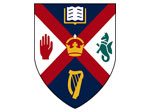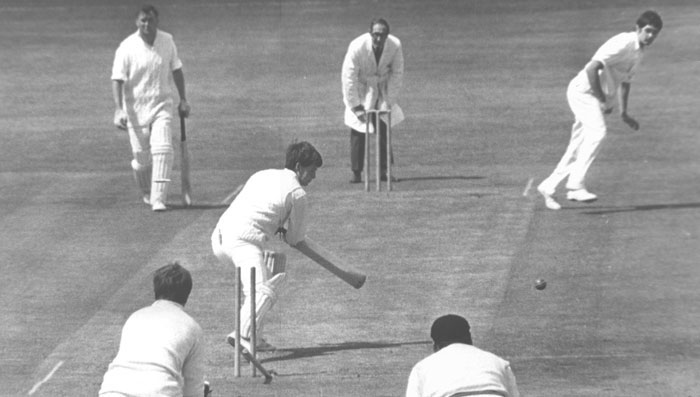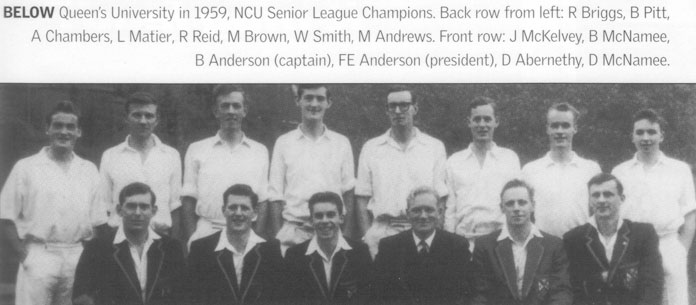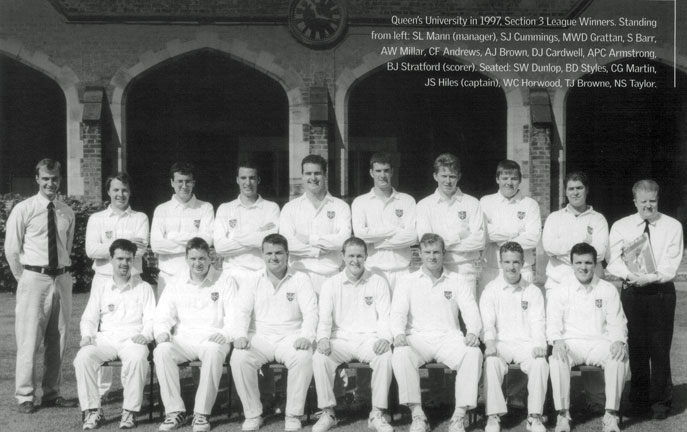 A lot has been said and written about the demise of senior cricket at Queens in the last decade, not all of it very constructive. That said, most of it has been well-meaning and if at times misdirected, it shows the underlying passion and deep sense of hurt felt by many former members when the decision was taken to withdraw the senior team from competitive NCU cricket five years ago.
A lot has been said and written about the demise of senior cricket at Queens in the last decade, not all of it very constructive. That said, most of it has been well-meaning and if at times misdirected, it shows the underlying passion and deep sense of hurt felt by many former members when the decision was taken to withdraw the senior team from competitive NCU cricket five years ago.
It was a sad culmination of many factors, not least the selfish and parochial ambitions of both individual clubs and their players, most of whom were prepared to sacrifice the university cause to meet their own objectives rather than play at the university or encourage their better players to play there while completing their studies. Of course everyone has a right to make their own call, but in the cold and insular world we live in, a short-term personal gain can often produce a more detrimental long-term loss in the bigger picture, and in the case of Queens University Cricket Club, this has already become all too apparent.
The contribution that Queens has made to Ulster and Irish cricket goes far beyond a few senior trophies that marked brief periods of success in a colourful history that began as far back as the 1860s when Queens College played an important part in the embryonic years of club cricket in Ulster.
University years are but a brief and all too fleeting little cameo in the passage of life, so undergraduates of the day enthusiastically embroiled themselves in university sports before returning to the wider sporting and business community, enriched by the experience. Cricket blossomed at Queens from 1860 to the turn of the century, not just in playing achievements on the field, but also in the way the game was played, the etiquette and sportsmanship that the students promoted, and the excellent ambassadors they sent out into the wider cricket community after their university days had finally come to an end. In the passage of time those fine pioneers also became leading stalwarts of the game and by 1939 alumni of Queens cricket included the great AB Mitchell of Cliftonville and NCU fame, and a plethora of brilliant players that included the Macdonald brothers James and TJ, big strapping Tommy Martin from Lisburn, the supremely gifted all round sportsman Tom McMurray, CL Sproule, WS Haydock, and double rugby and cricket international Bob Alexander, who tragically lost his life so heroically in the second world war. In later years the list included many more household names in local cricket and leading personalities like the Reverend Ronnie Craig, Frank Fee, Jimmy McKelvey, Basil McNamee, Ivan Anderson, Dermott Monteith, Robin Reid, Graham Crothers, Murray Power et al.

Tim English was a star bowler for Queen's in the late 1960s. Here he bowls Dermott Monteith in a league match against Lisburn at Upper Malone.
But the whole character of local cricket dramatically changed in the 1980s and some of the larger clubs became much more commercially focused in their pursuit of success, with the re-introduction of overseas professionals, hired guns and players moving for money. Indeed time was to prove there was no limit to the extent to which some of the more ambitious were prepared to go to achieve success. All this happened in the middle of some major social transformations caused by the Troubles, and the knock-on effect for many cricketers was a preference to stay closer to home and enjoy the comforts and camaraderie of their own thriving clubhouses on a Saturday evening. In marked contrast to the old days when opposing players usually stayed after games and enjoyed the post-match friendships that enhance the enjoyment of sport, many teams left immediately after games for comfort and safety closer to home.

Queens University played a significant part in the Troubles, and in the early years much of the political ideology and social agitation came from its campus. But peaceful marches and protests from fun-loving idealistic students soon gave way to a more violent period of civil disturbances, and the limelight quickly moved into the sectarian ghettos of the province, places that were to become household names across the world. When the Troubles 'officially' started in 1968 the university cricket club was in a healthy position, and the 1969 team captained by Stan Mitchell held great hopes of emulating the achievements of the great 1959 team that won the senior league title and came so close to a remarkable 'double' when they lost the cup final to the strong Lisburn team of the day. Mitchell's eleven also made it to the cup final, but they lost to North of Ireland in a low-scoring final, ironically with a number of former university players in the opposing team. Mitchell's team included a bevy of cricket personalities like Graham 'Doc' Crothers, Tim English, Ricky Finlay, Lowry Cunningham, George Martin, Terry Nesbitt and Mitchell himself, all of whom made significant contributions to the development of cricket throughout Ireland in the years that followed. This was very similar to that fine 1959 team that produced not only excellent cricketers, but wonderful ambassadors who enhanced and developed local cricket for many years from a wide array of locations and positions. Fine sportsmen like Robin Reid, Basil and Derek McNamee, Billy Smyth, 'Brandy' Anderson, Jimmy McKelvey, and Bob Matier, unsung heroes of the Ulster cricketing cause.
And despite the horrors of the Troubles, the university cricket team continued to prosper into the seventies when the inimitable 'Doc' Crothers surprised many people by leading his team to another cup final in 1973, sadly to emphatically fall against the mighty Waringstown. But in fine Queens University Cricket Club tradition, that same team also sent its own generation of cricket personalities back into the local game, led of course by the visionary 'Doc' and including such characters as Desssie Kane, the Reverend John Davey, Alvin McSparron, Alan McCully, Bertie McGill, Robert Farmer, Phillip Marshall et al.
It all looked good for the future, but unknown at the time, it was to prove the last of the great Queens teams, and the next two decades saw the club's fortunes decline as many potential cricket 'freshers' opted to remain with their clubs or ventured overseas to study. Queens gradually slipped down the ladder despite the valiant efforts of people like the long-serving Murray Power, and although Steven Hiles captained an enthusiastic team to section three glory in 1997, the cracks were widening so fast that the major decision to withdraw the senior team from NCU cricket was taken just a short time later when membership slumped to an all-time low.
The pleas for help to the parent union were viewed sympathetically in most quarters, but the realism of competitive Ulster cricket was that clubs were more anxious to protect their own positions rather than invest in a university cause that didn't give them any individual benefit. The core element of the debate was relegation, and since most clubs fought bitterly to stay in section one cricket, the idea of allowing a university side to remain irrespective of performance was always a non-runner. The alternative viewpoint however, was the belief that if the university team could be protected in section one or section two cricket, then it stood a good chance of attracting the better players to its numbers, some of whom were already studying at the university. But protected status didn't sit comfortably with rival clubs, and the chances of winning a two- thirds majority to secure it at the union's annual general meeting got more and more remote as winning became everything in the 1990s. In the absence of any other initiative to save quality senior cricket at Queens, many members became disillusioned, and inevitably left the ranks to get on with their cricket lives in pastures new.
In truth who could blame them, but rather than spend too much time dwelling on what could or should have been done, Queens University Cricket Club is at a crossroads in its existence and unless 'Friends of Queens' rally to the cause it will be gone forever.

What a tragedy for Irish, Ulster and university cricket.
Footnote: During his four years at Queens University Clarence Hiles played cricket and rugby at home clubs, a decision he has regretted ever since.
